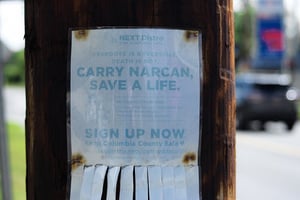Methadone, Buprenorphine After Opioid Overdose Associated With Lower Risk of Death
 |
“These findings suggest meaningful opportunities to improve engagement and retention in treatment of opioid use disorders after a nonfatal overdose,” wrote Marc Larochelle, M.D., M.P.H., of Boston Medical Center and colleagues.
Using the Massachusetts All-Payer Claims Database and several other linked Massachusetts state databanks, Larochelle and colleagues identified adults aged 18 and older who survived an opioid overdose between January 2012 and December 2014. The researchers also identified those who received medication for opioid use disorder, including methadone maintenance treatment (MMT), buprenorphine, or naltrexone.
In the 12 months after a nonfatal overdose, 2,040 people (11%) enrolled in MMT for a median of five months, 3,022 people (17%) received buprenorphine for a median of four months, and 1,099 persons (6%) received naltrexone for a median of one month.
Over 12 months of follow-up, 807 participants died of any cause and 368 died of an opioid-related overdose. Compared with individuals who received no treatment for opioid use disorder, those who received MMT or buprenorphine were less likely to die of any cause or of an opioid-related cause; reliable associations between treatment with naltrexone and all-cause and opioid-related death could not be ascertained owing to the small number of patients receiving naltrexone—a limitation to the study the researchers acknowledged.
Larochelle and colleagues noted that rates of treatment initiation are inversely proportional to the lag in time between being offered treatment and being able to start. “New models that offer treatment initiation and linkage to care from emergency department and inpatient settings have demonstrated increased treatment engagement,” they wrote. “Our findings also show that treatment initiation without retention undermines benefits.”
In an accompanying editorial, Nora Volkow, M.D., and Eric Wargo, Ph.D., of the National Institute on Drug Abuse, offered several strategies to increase medication-assisted therapy delivery to people at risk for opioid overdose. “A great part of the tragedy of this opioid crisis is that, unlike in previous such crises America has seen, we now possess effective treatment strategies that could address it and save many lives, yet tens of thousands of people die each year because they have not received these treatments,” they wrote. “Ending the crisis will require changing policies to make these medications more accessible and educating primary care and emergency providers, among others, that opioid addiction is a medical illness that must be treated aggressively with the effective tools that are available.”
For related information, see the Psychiatric News article “Why Aren't More Physicians Prescribing Buprenorphine?” and the Psychiatric Services article “Three-Year Retention in Buprenorphine Treatment for Opioid Use Disorder Among Privately Insured Adults.”
(Image: iStock/shironosov)






